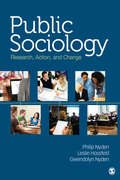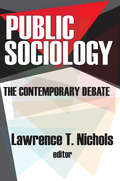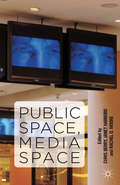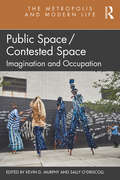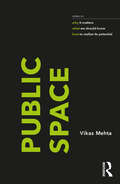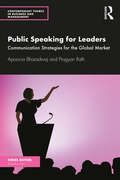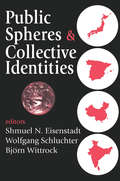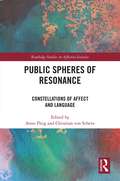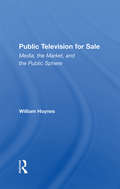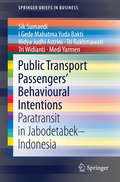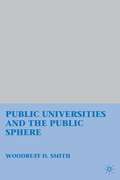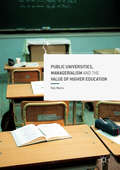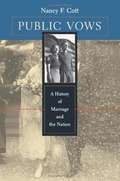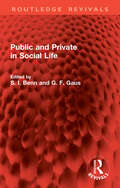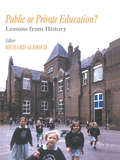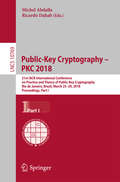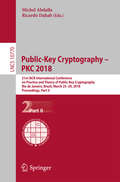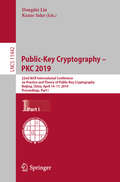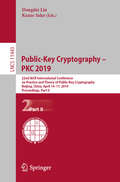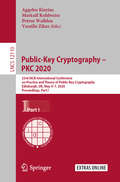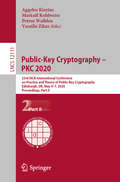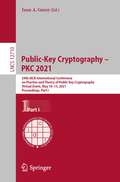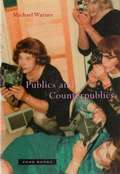- Table View
- List View
Public Sociology: Research, Action, and Change
by Dr Philip W. Nyden Dr Leslie H. Hossfeld Gwendolyn NydenThis timely resource, written by a team of authors who are working at the forefront of the public sociology movement, provides a contemporary analysis of public sociology. The book highlights a variety of ways in which sociology brings about social change in community settings, assists nonprofit and social service organizations in their work, and influences policy at the local, regional, and national levels. The book also spotlights sociology that informs the general public on key policy issues through media and creates research centers that develop and carry out collaborative research.
Public Sociology: The Contemporary Debate
by Lawrence T. NicholsPublic Sociology features a wide-ranging discussion of the controversial model of a social science that reaches out to non-academic audiences, including both average citizens and policymakers. This approach has been greeted with enthusiasm by supporters, and with skepticism and anxiety among critics. Both perspectives are well represented in this volume.Some of the critical voices question whether public sociology is even a good idea. Others dissent, arguing for a strong program in professional sociology as an alternative. Still others express concern that public sociology promotes a liberal-left political agenda, despite its nonpartisan pretensions. Some elements of the model are queried, such as ""critical sociology."" Others are supportive--discussing personal experiences, the benefits of an engaged social science, and how it could take social science into a broader, global marketplace.Following an introduction by the editor, the contributions include: David Boyns and Jesse Fletcher, ""Public Relations, Disciplinary Identity, and the Strong Program in Professional Sociology,"" Jonathan H. Turner, ""Is Public Sociology Such a Good Idea?"" Steven Brint, ""Guide to the Perplexed,"" Vincent Jeffries, ""Piritim A. Sorokin's Integralism and Public Sociology,"" Norella M. Putney, Dawn E. Alley, and Vern L. Bengston, ""Social Gerontology as Public Sociology in Action,"" Edna Bonacich, ""Working with the Labor Movement: A Personal Journey in Organic Public Sociology,"" Christopher Chase-Dunn, ""Globabl Public Social Science,"" Neil McLauglin, Lisa Kowalchuk, and Kerry Turcotte, ""Why Sociology Does Not Need to be Saved,"" Michael Burawoy, ""Third-Wave Sociology and the End of Pure Science,"" Patricia Madoo Lengerman and Jill Niebrugge-Brantley, ""Back to the Future: Settlement Sociology, 1885i?1/2-1930,"" Sean McMahon, ""From the Platform: Public Sociology in the Speeches of Edward A. Ross,"" Chet Ballard, ""The Origin and Early History of the Association for Humanist So
Public Space, Media Space: Media, Technology, And The Experience Of Social Space (Public Worlds Ser. #17)
by Chris Berry Rachel Moore Janet HarbordPublic Space, Media Space asks how media saturation are transforming public space and our experience of it. From the role of graffiti and Youtube videos of street art in the Cairo revolution, to OOH (Out of Home) advertising, the book is diverse in its approach and global in its coverage.
Public Space/Contested Space: Imagination and Occupation (The Metropolis and Modern Life)
by Kevin D. MurphyIt is not possible to be alive today in the United States without feeling the influence of the political climate on the spaces where people live, work, and form communities. Public Space/Contested Space illustrates the ways in which creative interventions in public space have constituted a significant dimension of contemporary political action, and how this space can both reflect and spur economic and cultural change. Drawing insight from a range of disciplines and fields, the essays in this volume assess the effectiveness of protest movements that deploy bodies in urban space, and social projects that build communities while also exposing inequalities and presenting new political narratives. With sections exploring the built environment, artists, and activists and public space, the book brings together the diverse voices to reveal the complexities and politicization of public space within the United States. Public Space/Contested Space provides a significant contribution to an understudied dimension of contemporary political action and will be a resource to students of urban studies and planning, architecture, sociology, art history, and human geography.
Public Space: notes on why it matters, what we should know, and how to realize its potential
by Vikas MehtaPublic Space: notes on why it matters, what we should know, and how to realize its potential journeys a vast territory and presents a panoramic view of public space—an understanding from numerous disciplines—under one cover in an incisive and concise manner. As a dialogue between the social-political and the material-physical, the book brings together the key ideas that encompass the social, political, and physical issues in the making and experience of public space. The book is at the same time a primer and a progressive text. It makes the case for public space, digs deep into understanding what public space is, followed by three sections that present the inherent paradoxes, the possibilities, and propositions for a more meaningful public space. The book presents ideas in concise and approachable ways—from established tenets to new propositions—that are constructive and thought-provoking, with many that will challenge the reader’s preconceived notions. Students and scholars in the built environment disciplines and social sciences, public space managers, public and private sector practitioners, and civic leaders, but also residents who want to better understand and make an impact in their communities and cities will find Public Space to be a valuable resource.
Public Speaking for Leaders: Communication Strategies for the Global Market (Contemporary Themes in Business and Management)
by Pragyan Rath Apoorva BharadwajThis book studies the art of public speaking as oration instead of just ornamentation. It repositions public speaking as a fundamental business leadership act and a solution-enabling and problem-solving communication approach. Drawing on in-depth case studies, it considers various situations that a managerial leader encounters and delivers speech solutions as strategic manoeuvres for attaining desired targets. The volume: Deals with public speaking exclusively from a business perspective; Produces a workable manual of managerial public speaking that introduces the concept of oration as Or-action (oratory that leads to desired action); Presents a variegated analysis of speech texts from history, politics, fiction, social media, film industry, platform content, and business-product presentations; Customizes speeches into unique speech clusters where readers can readily find the type of speech texts they require for their own specific content development. The first of its kind, this book will be a key text for entrepreneurs, corporate managers, academic practitioners, and executives. It will also be of interest to students and researchers of behavioural economics, rhetoric, strategy, communication studies, business communication, fiction theory, generation studies, and virtual reality studies.
Public Spheres and Collective Identities
by Walter LippmannToday it is assumed that we understand contemporary nationalism and nation-building. Researchers rarely consider the very different traditions from which such state-building emerged. Instead, there is almost too much discussion of the "global village," with its supposed uniformity and inevitable trajectories. We need to view modernity as something other than a single condition with a preordained future. New visions of a modern civilization are emerging throughout the world, calliing for a far-reaching appraisal of the older visions of modernization.Following Eisenstadt's and Schluchter's introduction, Bjorn Wittrock explores the varieties and transitions of early modern societies, noting that only by looking at societies' collective identities and their modes of mediating in the public sphere can the distinguishing factors between modernity be appreciated. Sheldon Pollock discusses the use of vernacular language in India through its literary culture and polity, 1000-1500. Sanjay Subrahmanyam, sums up major developments in the recent historiography of South Asia from 1400 to 1750. David L. Howell focuses on the boundaries of the early modern Japanese state, including its political boundaries and the boundaries of collective identity and social status. Mary Elizabeth Berry examines public life in authoritarian Japan. Frederic Wakeman, Jr. probes the boundaries of the political game and how they were affected by the increased political centralization that developed after the disorder of the Ming-Qing transition during the seventeenth century. Alexander Woodside discusses territorial order and collective-identity tensions in Confucian Asia. Bernhard Giesen argues that the French Enlightenment can be described as an extension of absolutist court culture. Finally essay, Victor Perez-Diaz examines the state and public sphere in Spain during the Ancient Regime contrasting two ideal types of states--a "nomocratic" model and a "teleocratic" model.This volume addresses cultural and political practices not only from outside the European and American spheres but also over long periods of time in which the internal dynamics of other civilizations become visible. Its broad-ranging use of empirical materials enables us to think comparatively and historically about the ways in which different modernities took shape.
Public Spheres of Resonance: Constellations of Affect and Language (Routledge Studies in Affective Societies)
by Christian Von Scheve Anne FleigTo understand the profound changes in the modes of public political debate over the past decade, this volume develops a new conception of public spheres as spaces of resonance emerging from the power of language to affect and to ascribe and instill collective emotion. Political discourse is no longer confined to traditional media, but increasingly takes place in fragmented and digital public spheres. At the same time, the modes of political engagement have changed: discourse is said to increasingly rely on strategies of emotionalization and to be deeply affective at its core. This book meticulously shows how public spheres are rooted in the emotional, bodily, and affective dimensions of language, and how language – in its capacity to affect and to be affected – produces those dynamics of affective resonance that characterize contemporary forms of political debate. It brings together scholars from the humanities and social sciences and focuses on two fields of inquiry: publics, politics, and media in Part I, and language and artistic inquiry in Part II. The thirteen chapters provide a balanced composition of theoretical and methodological considerations, focusing on highly illustrative case studies and on different artistic practices. The volume is an indispensable source for researchers and postgraduate students in cultural studies, literary studies, sociology, and political science. It likewise appeals to practitioners seeking to develop an in-depth understanding of affect in contemporary political debate.
Public Television For Sale: Media, The Market, And The Public Sphere
by William HoynesPublic television is uniquely positioned in our country to contribute to the invigoration of democratic public life because, ostensibly, it is neither driven by the market nor dominated by the state. In this comprehensive analysis of the forces that shape our public television system, sociologist William Hoynes finds that public television increasi
Public Transport Passengers' Behavioural Intentions
by Sik Sumaedi I. Gede Mahatma Yuda Bakti Nidya Judhi Astrini Tri Rakhmawati Tri Widianti Medi YarmenThis book is based on the behavioural intention of public transport passengers and the relationship between those factors in Indonesia. The conceptual model in this book explains behavioural intentions of paratransit passengers which can result in recommendations to unravel the complexity of the congestion problem from consumer behaviour perspective. Based on the results of survey research on behavioural intention of public transport users in Jabodetabek, Indonesia, the result of the study is presented in a model that describes the factors that influence. This book is recommended for academics who wish to gain knowledge about the phenomenon of consumer behaviour, for regulators whose duty is to make a decision and determine the strategic steps to overcome congestion and researchers who want to develop their knowledge and provide solutions related to congestion from the perspective of consumer behaviour.
Public Trust in Business
by Andrew C. Wicks Jared D. Harris Brian T. Moriarty Jared D. Harris Brian T. MoriartyPublic trust in business is one of the most important but least understood issues for business leaders, public officials, employees, NGOs and other key stakeholders. This book provides much-needed thinking on the topic. Drawing on the expertise of an international array of experts from academic disciplines including business, sociology, political science and philosophy, it explores long-term strategies for building and maintaining public trust in business. The authors look to new ways of moving forward, by carefully blending the latest academic research with conclusions for future research and practice. They address core drivers of public trust, how to manage it effectively, the consequences of low public trust, and how best to address trust challenges and repair trust when it has been lost. This is a must-read for business practitioners, policy makers and students taking courses in corporate social responsibility or business ethics.
Public Universities and the Public Sphere
by Woodruff D. SmithPublic Universities and the Public Sphere argues that two crises facing America - a crisis of public discourse and a crisis of public higher education - are closely connected. Part of the solution, Smith argues in this timely work, to both crises lies in understanding and building on the connection.
Public Universities, Managerialism and the Value of Higher Education (Palgrave Critical University Studies)
by Rob WattsThis book provides a rigorous examination into the realities of the current university system in Britain, America and Australia. The radical makeover of the higher education system which began in the 1980s has conventionally been understood as universities being transformed into businesses which sell education and research in a competitive market. This engaging and provocative book argues that this is not actually the case. Drawing on lived experience, Watts asserts that the reality is actually a consequence of contradictory government policy and new public management whose exponents talk and act ‘as-if’ universities have become businesses. The result of which is ‘market crazed governance’, whereby universities are subjected to expensive rebranding and advertising campaigns and the spread of a toxic culture of customer satisfaction surveys which ask students to evaluate their teachers and what they have learned, based on government ‘metrics’ of research ‘quality’.This has led to a situation where not only the normal teacher-student relationship is inverted, academic professional autonomy is eroded and many students are short-changed, but where universities are becoming places whose leaders are no longer prepared to tell the truth and too few academics are prepared to insist they do. An impassioned and methodical study, this book will be of great interest to academics and scholars in the field of higher education and education policy.
Public Vows: A History of Marriage and the Nation
by Nancy F. CottWe commonly think of marriage as a private matter between two people, a personal expression of love and commitment. In this pioneering history, Nancy F. Cott demonstrates that marriage is and always has been a public institution.
Public and Private in Social Life (Routledge Revivals)
by S. I. Benn G. F. GausConceptions of publicness and privateness structure not only our thinking about society and ourselves, but also, by structuring our institutions and practices, dictate how we act within society. Originally published in 1983, the complexity inherent in the distinction between public and private is explored fully in this book.Opening chapters examine the familiar western liberal understanding of the public and the private; how it reflects not always coherent ideas about the relation of individuals to society, and how it structures legal, political, economic and moral practices and institutions.Attention is turned to Hegelian, Marxist and feminist critiques on the public and private dichotomy, and the study concludes with a comparative analysis of the public and the private in three non-western forms of society. In all, this study provides a fascinating insight into the ways different societies see themselves and into the concepts that shape society today.
Public or Private Education?: Lessons from History (Woburn Education Series)
by Richard AldrichThis collection of essays, edited by the distinguished historian of education Richard Aldrich, examines past, present and future relationships between the private and public dimensions of knowledge and education. Following the introduction, it is divided into three sections: * key themes and turning points in Britain in the eighteenth, nineteenth and twentieth centuries* examples from the twentieth century of non formal education with particular reference to girls and women, the care and education of pre-school children, sex education and family history* an analysis of the private and public dimensions associated with globalization and international education and of examples drawn from Australia and the USA. This book will become required reading not only in respect of contemporary and historical debates about private and public spheres in education, but also with reference to the wider themes of the creation, diffusion and ownership of knowledge.
Public-Key Cryptography – PKC 2018: 21st Iacr International Conference On Practice And Theory Of Public-key Cryptography, Rio De Janeiro, Brazil, March 25-29, 2018, Proceedings (Lecture Notes in Computer Science #10770)
by Michel Abdalla Ricardo DahabThe two-volume set LNCS 10769 and 10770 constitutes the refereed proceedings of the 21st IACR International Conference on the Practice and Theory of Public-Key Cryptography, PKC 2018, held in Rio de Janeiro, Brazil, in March 2018. The 49 revised papers presented were carefully reviewed and selected from 186 submissions. They are organized in topical sections such as Key-Dependent-Message and Selective-Opening Security; Searchable and Fully Homomorphic Encryption; Public-Key Encryption; Encryption with Bad Randomness; Subversion Resistance; Cryptanalysis; Composable Security; Oblivious Transfer; Multiparty Computation; Signatures; Structure-Preserving Signatures; Functional Encryption; Foundations; Obfuscation-Based Cryptographic Constructions; Protocols; Blockchain; Zero-Knowledge; Lattices.
Public-Key Cryptography – PKC 2018: 21st Iacr International Conference On Practice And Theory Of Public-key Cryptography, Rio De Janeiro, Brazil, March 25-29, 2018, Proceedings (Lecture Notes in Computer Science #10770)
by Michel Abdalla Ricardo DahabThe two-volume set LNCS 10769 and 10770 constitutes the refereed proceedings of the 21st IACR International Conference on the Practice and Theory of Public-Key Cryptography, PKC 2018, held in Rio de Janeiro, Brazil, in March 2018. The 49 revised papers presented were carefully reviewed and selected from 186 submissions. They are organized in topical sections such as Key-Dependent-Message and Selective-Opening Security; Searchable and Fully Homomorphic Encryption; Public-Key Encryption; Encryption with Bad Randomness; Subversion Resistance; Cryptanalysis; Composable Security; Oblivious Transfer; Multiparty Computation; Signatures; Structure-Preserving Signatures; Functional Encryption; Foundations; Obfuscation-Based Cryptographic Constructions; Protocols; Blockchain; Zero-Knowledge; Lattices.
Public-Key Cryptography – PKC 2019: 22nd IACR International Conference on Practice and Theory of Public-Key Cryptography, Beijing, China, April 14-17, 2019, Proceedings, Part I (Lecture Notes in Computer Science #11442)
by Dongdai Lin Kazue SakoThe two-volume set LNCS 11442 and 11443 constitutes the refereed proceedings of the 22nd IACR International Conference on the Practice and Theory of Public-Key Cryptography, PKC 2019, held in Beijing, China, in April 2019. The 42 revised papers presented were carefully reviewed and selected from 173 submissions. They are organized in topical sections such as: Cryptographic Protocols; Digital Signatures; Zero-Knowledge; Identity-Based Encryption; Fundamental Primitives; Public Key Encryptions; Functional Encryption; Obfuscation Based Cryptography; Re- Encryption Schemes; Post Quantum Cryptography.
Public-Key Cryptography – PKC 2019: 22nd IACR International Conference on Practice and Theory of Public-Key Cryptography, Beijing, China, April 14-17, 2019, Proceedings, Part I (Lecture Notes in Computer Science #11442)
by Dongdai Lin Kazue SakoThe two-volume set LNCS 11442 and 11443 constitutes the refereed proceedings of the 22nd IACR International Conference on the Practice and Theory of Public-Key Cryptography, PKC 2019, held in Beijing, China, in April 2019. The 42 revised papers presented were carefully reviewed and selected from 173 submissions. They are organized in topical sections such as: Cryptographic Protocols; Digital Signatures; Zero-Knowledge; Identity-Based Encryption; Fundamental Primitives; Public Key Encryptions; Functional Encryption; Obfuscation Based Cryptography; Re- Encryption Schemes; Post Quantum Cryptography.
Public-Key Cryptography – PKC 2019: 22nd IACR International Conference on Practice and Theory of Public-Key Cryptography, Beijing, China, April 14-17, 2019, Proceedings, Part II (Lecture Notes in Computer Science #11443)
by Dongdai Lin Kazue SakoThe two-volume set LNCS 11442 and 11443 constitutes the refereed proceedings of the 22nd IACR International Conference on the Practice and Theory of Public-Key Cryptography, PKC 2019, held in Beijing, China, in April 2019. The 42 revised papers presented were carefully reviewed and selected from 173 submissions. They are organized in topical sections such as: Cryptographic Protocols; Digital Signatures; Zero-Knowledge; Identity-Based Encryption; Fundamental Primitives; Public Key Encryptions; Functional Encryption; Obfuscation Based Cryptography; Re- Encryption Schemes; Post Quantum Cryptography.
Public-Key Cryptography – PKC 2020: 23rd IACR International Conference on Practice and Theory of Public-Key Cryptography, Edinburgh, UK, May 4–7, 2020, Proceedings, Part I (Lecture Notes in Computer Science #12110)
by Vassilis Zikas Aggelos Kiayias Markulf Kohlweiss Petros WalldenThe two-volume set LNCS 12110 and 12111 constitutes the refereed proceedings of the 23rd IACR International Conference on the Practice and Theory of Public-Key Cryptography, PKC 2020, held in Edinburgh, UK, in May 2020. The 44 full papers presented were carefully reviewed and selected from 180 submissions. They are organized in topical sections such as: functional encryption; identity-based encryption; obfuscation and applications; encryption schemes; secure channels; basic primitives with special properties; proofs and arguments; lattice-based cryptography; isogeny-based cryptography; multiparty protocols; secure computation and related primitives; post-quantum primitives; and privacy-preserving schemes.
Public-Key Cryptography – PKC 2020: 23rd IACR International Conference on Practice and Theory of Public-Key Cryptography, Edinburgh, UK, May 4–7, 2020, Proceedings, Part II (Lecture Notes in Computer Science #12111)
by Vassilis Zikas Aggelos Kiayias Markulf Kohlweiss Petros WalldenThe two-volume set LNCS 12110 and 12111 constitutes the refereed proceedings of the 23rd IACR International Conference on the Practice and Theory of Public-Key Cryptography, PKC 2020, held in Edinburgh, UK, in May 2020. The 44 full papers presented were carefully reviewed and selected from 180 submissions. They are organized in topical sections such as: functional encryption; identity-based encryption; obfuscation and applications; encryption schemes; secure channels; basic primitives with special properties; proofs and arguments; lattice-based cryptography; isogeny-based cryptography; multiparty protocols; secure computation and related primitives; post-quantum primitives; and privacy-preserving schemes.
Public-Key Cryptography – PKC 2021: 24th IACR International Conference on Practice and Theory of Public Key Cryptography, Virtual Event, May 10–13, 2021, Proceedings, Part I (Lecture Notes in Computer Science #12710)
by Juan A. GarayThe two-volume proceedings set LNCS 12710 and 12711 constitutes the proceedings of the 24th IACR International Conference on Practice and Theory of Public Key Cryptography, PKC 2021, which was held online during May 10-13, 2021. The conference was originally planned to take place in Edinburgh, UK, but had to change to an online format due to the COVID-19 pandemic.The 52 papers included in these proceedings were carefully reviewed and selected from 156 submissions. They focus on all aspects of public-key cryptography, covering theory, implementations and applications. This year, post-quantum cryptography, PQC constructions and cryptanalysis received special attention.
Publics and Counterpublics
by Michael WarnerMichael Warner addresses the question: What is a public? According to Warner, the idea of a public is one of the central fictions of modern life. Publics have powerful implications for how our social world takes shape, and much of modern life involves struggles over the nature of publics and their interrelations. The idea of a public contains ambiguities, even contradictions. As it is extended to new contexts, politics, and media, its meaning changes in ways that can be difficult to uncover. Combining historical analysis, theoretical reflection, and extensive case studies, Warner shows how the idea of a public can reframe our understanding of contemporary literary works and politics and of our social world in general.
